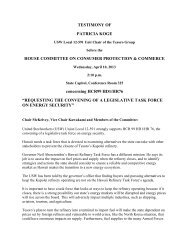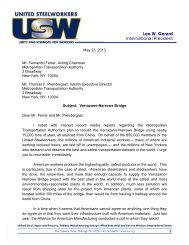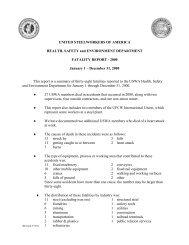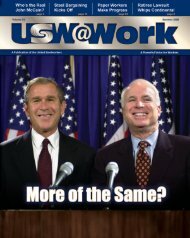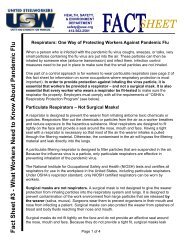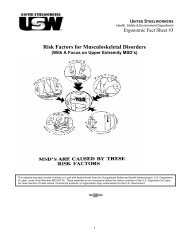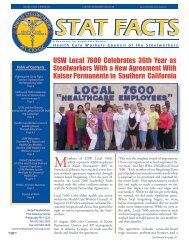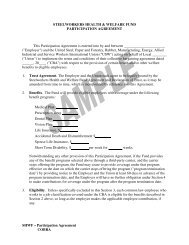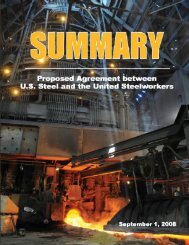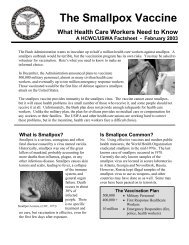Leo W. Gerard - United Steelworkers
Leo W. Gerard - United Steelworkers
Leo W. Gerard - United Steelworkers
Create successful ePaper yourself
Turn your PDF publications into a flip-book with our unique Google optimized e-Paper software.
As of press time, the status of health insurance<br />
reform legislation was in limbo. But what is clearer<br />
than ever is the message working people across the<br />
nation are sending politicians on both sides of the<br />
aisle: inaction is not acceptable.<br />
In January, Massachusetts voters chose Republican Scott<br />
Brown as their next U.S. senator, filling the vacancy created<br />
when longtime Sen. Ted Kennedy died last year.<br />
“It was a working-class revolt – a signal that in this<br />
economic crisis, the American people demand jobs, health<br />
care and an economy that works for them now – not political<br />
business as usual,” AFL-CIO President Richard Trumka said.<br />
“It was a loud and clear message that our elected leaders and<br />
our labor movement must do more for working people, do it<br />
fast and do it smarter.”<br />
International President <strong>Leo</strong> W. <strong>Gerard</strong> expressed similar<br />
thoughts and said it’s important for USW members and others<br />
to keep fighting and to know that their union is working for<br />
them and their families.<br />
Frustrated with status quo<br />
“Working families are growing increasingly frustrated<br />
with the status quo,” <strong>Gerard</strong> said. “It’s not about the right or<br />
left, it’s about what’s right and what’s wrong. What’s right<br />
for this country is action – not just talk – to create and sustain<br />
good jobs, to fix our economy for Main Street, not just Wall<br />
Street, and to approve health insurance reform that cuts costs,<br />
covers every American and doesn’t do it by taxing our benefits.”<br />
Proposed health insurance reform had not passed as<br />
USW@Work went to print. The White House had listened<br />
to some of our concerns regarding a proposed excise tax on<br />
high-cost insurance plans.<br />
Here’s where things stood at press time: An agreement<br />
was reached in principle to exclude collectively bargained<br />
plans from the tax until 2018 and to help in various other<br />
ways that would reduce the impact of the tax on all middleclass<br />
workers.<br />
Essential reform components<br />
The USW supports the progress that would help lessen the<br />
impact on members, but prefers health insurance reform that<br />
does not tax benefits at all. The union has been clear that we<br />
support a plan with these essential components:<br />
• Affordable options and reform of insurance practices<br />
that will result in health care for all Americans.<br />
• A public option that will lower costs by competing<br />
with the private sector and offer coverage for Americans<br />
who cannot afford alternatives.<br />
• No taxation for employer-provided insurance and<br />
rules to ensure big employers retain coverage.<br />
• Shared responsibility by requiring all employers to<br />
provide coverage, also known as “pay to play.”<br />
• Significant cost containment to help families, retirees,<br />
businesses and our governments.<br />
• A federally funded catastrophic reinsurance program<br />
to help employers and Voluntary Employees’ Beneficiary<br />
Associations (VEBAs) that provide benefits for<br />
pre-Medicare retirees aged 55 to 64.<br />
Visit www.usw.org for the latest.<br />
Put this on your shopping list. Buy some Sylvania<br />
Super Saver energy-efficient halogen light bulbs,<br />
help save an endangered American industry and some<br />
Steelworker jobs.<br />
The incandescent light bulbs in use for more than a<br />
century since the days of Thomas Alva Edison will begin to<br />
fade away in 2012 under new federal regulations designed to<br />
increase energy efficiency.<br />
The Energy Independence and Security Act, signed into<br />
law by former President Bush on Dec. 19, 2007, requires that<br />
light bulbs sold in the <strong>United</strong> States use 25 to 30 percent less<br />
energy.<br />
As a result, the familiar incandescent light bulbs, which<br />
fail to meet efficiency requirements in the law, will be phased<br />
out over a few years. You can expect 100-watt bulbs to disappear<br />
from markets in 2012. The 75-watt bulb will be gone by<br />
2013. The smaller 40- and 60-watt bulbs will phase out by<br />
2014.<br />
As the technology changes, major manufacturers are relocating<br />
production from the <strong>United</strong> States to China and other<br />
countries.<br />
Osram Sylvania, however, has decided to introduce a<br />
new product, the Sylvania Super Saver halogen bulb, into the<br />
<strong>United</strong> States and manufacture it at existing facilities, including<br />
a USW-represented glass plant in Wellsboro, Pa.<br />
Wellsboro currently produces the envelope or outer glass<br />
portion of incandescent<br />
light bulbs that are<br />
assembled at Osram-<br />
Sylvania’s plant in Saint<br />
Mary’s, Pa. It also makes<br />
bulbs for Christmas ornaments.<br />
USW Local 1001, which represents about 110 Wellsboro<br />
employees, had been warned that the new efficiency standards<br />
will jeopardize its main product, the incandescent bulb.<br />
But the new halogen bulb could, if it takes off in the market,<br />
help to maintain employment at Wellsboro as the incandescent<br />
bulbs are removed from sale.<br />
“It will at least help us maintain the status quo,’’ said<br />
Barry Mortimer, a member of Local 1001 and the local’s<br />
Rapid Response coordinator.<br />
No health hazards<br />
The new Super Saver halogen bulbs can be produced on<br />
existing equipment and do not have some of the potential<br />
health hazards of its main competition, compact fluorescent<br />
light (CFL) bulbs that are largely made in China with toxic<br />
mercury as a key ingredient.<br />
Workers handle mercury in either solid or liquid form<br />
because a small amount of the metal is put into each CFL<br />
bulb to start the chemical reaction that creates light. Breaking<br />
a CFL bulb at home requires an EPA-approved clean up<br />
procedure.<br />
Mercury is recognized as a health hazard by authorities<br />
worldwide because its accumulation in the body can damage<br />
the nervous system, lungs and kidneys. It poses a particular<br />
threat to babies in the womb and young children.<br />
American made<br />
The American-made Super Saver halogen bulb has no<br />
mercury, meets the government’s energy savings standards<br />
and supports USW members. If you break one at home, clean<br />
up the broken glass and throw it into the trash.<br />
“Osram Sylvania is encasing halogen inside a glass capsule<br />
and then putting that in a traditional-looking glass bulb<br />
made at Wellsboro,” said Mickey Bolt, a field coordinator<br />
with the Alliance for American Manufacturing, an organization<br />
supported by the USW.<br />
The bulbs are currently in production. So far, they can be<br />
purchased in Menards and many BJ’s Wholesale Club stores<br />
in the midwest. Lowe’s home improvement stores will carry<br />
them starting this summer.<br />
Until more retailers get on board, Mortimer said they can<br />
be purchased on line at: http://www.sylvaniaonlinestore.com.<br />
26 USW@Work • Winter 2010<br />
USW@Work • Winter 2010 27



